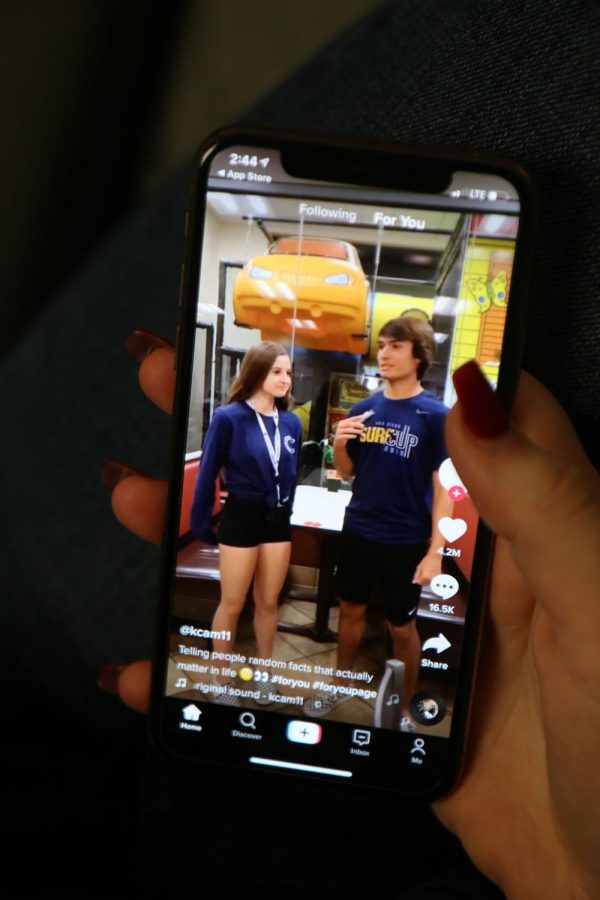Short Videos, Big Concerns
TikTok’s growing popularity creates concerns over the company’s use of data
Photo: Theo Mahlum
Senior Kedzie Moe’s TikTok feed. Moe is one of many UPrep students to use the social media platform, TikTok. These countless hours scrolling create large amounts of data that some fear could be used dangerously.
It only took senior Jason Xu a couple of clicks to retrieve the usage data off his phone. In the past week, Xu reported, he had spent precisely six hours and 37 minutes on the increasingly popular video-sharing platform, TikTok.
TikTok is a relatively new social media platform where users can view and share videos with others. For Xu, the app is highly addictive.
“With TikToks, each video is 15 to 60 seconds. Whenever you hop into TikTok you’re like, ‘OK, these aren’t going to be that long.’ You keep on scrolling [for what] ends up being like a few hours at a time,” he said.
While teens keep scrolling, the app’s growing influence on modern society could pose unforeseen data security risks. TikTok has attracted particular attention due to the company’s ties to China.
According to App Analytics site—Sensor Tower, the social media platform has racked up almost 1.5 billion downloads in the App Store, and University Prep students are no exception. Recently, the U.S. government called into question the security practices of TikTok and its parent organization, China-based ByteDance. U.S. officials remain concerned about the possible propaganda threats from China that could influence the 2020 American presidential election.
While TikTok maintains that it will not “remove content based on sensitivities related to China,” according to jounralist William Feuer, the company has placed restrictions on the sharing of politically-tense content during events such as the Hong Kong pro-democracy protests.
As reported by the Washington Post, during the Hong Kong demonstrations, TikTok’s parent company, ByteDance, determined the final content present on the app. Following Chinese censorship norms, “officials in Beijing had the final call on whether flagged videos were approved,” as stated in a 2019 article in The Washington Post.
Despite the U.S. government’s apprehension, UPrep students do not share a similar level of concern with data privacy issues.
Senior Mark Fishman, a TikTok user, stated that he doesn’t feel like TikTok’s practices are particularly invasive.
“I really don’t think they’re going to get much data out of people if it’s legit just a comedy app,” Fishman said. “I don’t think it’s a really big deal.”
Any misuse of data, junior and TikTok user Claiborne Probst expressed, can be problematic for some.
“I just don’t want [TikTok] taking my information and using it for some other thing. That’s scary,” he said.
Senior and TikTok user, Devin Wagner expressed that he doesn’t feel like TikTok has behaved any differently from other social media platforms.
“At this point, what’s not a Chinese app that’s trying to track you, you know?” Wagner said.
Growing up with the internet in their back pockets, intrusion on personal privacy has become normalized. Because of this, some of today’s teenagers may not fear TikTok’s potentially invasive data practices as invasive data practices have been normalized by American social media platforms.
“With most social media, what you post could end up on the internet. It’s hard to take off,” Xu said. “I think since people are used to using Instagram and Snapchat. Stuff like that doesn’t seem scary.”
Your donation will support the student journalists of UPrep.


